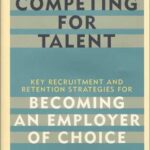As Business News Daily reports, 60.7% of small business owners see hiring the right talent as a major challenge. For companies competing for skilled professionals, recruiting top-notch talent becomes increasingly more difficult by the day. Compounding the issue is the mass retirement of Baby Boomers, leaving a scarcity of skilled candidates.
With fewer applicants applying for open positions, many employers are eager to hire candidates even when 82% of hiring managers say they saw signs that their new hire would fail. Bad hires ultimately lead to costly consequences in the long run, whether due to time constraints or an overemphasis on the candidate’s technical qualifications.
According to a recent survey by LeadershipIQ, 46% of new hires fail within 18 months, underscoring the risks of hasty hiring decisions. Moreover, replacing an employee can cost a business up to 150% of the employee’s annual salary, as detailed in our article “How to Calculate the Cost of Employee Turnover.” Therefore, prioritizing the selection of suitable candidates is crucial for every employee-oriented business.
Contrary to conventional wisdom, it’s not solely technical ability that determines the success or failure of new hires. The extensive study by LeadershipIQ involving thousands of recruits and HR professionals uncovered a remarkable truth:
A significant portion of hiring failures can be attributed to deficiencies in attitude rather than a lack of technical skills.
Specifically, the data indicates that while only 11% of hiring failures stem from technical deficiencies, a staggering 89% result from attitude-related issues, which should give every hiring manager pause. This revelation underscores the critical imperative for organizations to prioritize these attributes when evaluating applicants, ensuring they possess the essential qualities.
Drilling deeper into the study, we discover that the top 5 reasons why new hires failed were as follows:
- Coachability (26%): The ability to accept and implement feedback from bosses, colleagues, customers, and others.
- Emotional Intelligence (23%): The ability to understand and manage one’s own emotions and accurately assess others’ emotions.
- Motivation (17%): Sufficient drive to achieve one’s full potential and excel in the job.
- Temperament (15%): Attitude and personality suited to the particular job and work environment.
- Technical Competence (11%): Functional or technical skills required to do the job.
In his book How to Make a Few Billion Dollars, Brad Jacobs lists four key attributes he used when building a team. Being smart, hardworking, honest, and kindhearted.
Synthesizing the data from LeadershipIQ and the experiences of Brad Jacobs, four fundamental attributes serve as the four pillars of attitude for hiring successfully, which are:
- Intelligence
- Diligence
- Integrity
- Compassion
Intelligence (Navigating Complexity with Agility)
Demonstrating cognitive agility, problem-solving prowess, and adaptability to navigate complex challenges effectively.
In hiring, intelligence encompasses cognitive agility, adaptability, and emotional intelligence. Intelligent individuals not only excel at problem-solving and quickly grasping new concepts but also possess the ability to understand and manage their emotions and those of others. In this context, intelligence extends beyond cognitive abilities, including emotional intelligence, which is crucial for effective communication, collaboration, and leadership. For example, a skilled mechanic not only demonstrates intelligence in diagnosing and repairing complex mechanical issues but also exhibits emotional intelligence in understanding and addressing the concerns of clients and colleagues. Similarly, a proficient draftsman showcases intelligence not only in creating precise technical drawings but also in effectively navigating interpersonal dynamics within a team. Therefore, within the hiring framework, intelligence encompasses both cognitive agility and emotional intelligence, reflecting an individual’s capacity to excel in their specific domain of expertise while fostering positive relationships and contributing to a collaborative work environment.
Diligence (Exemplifying Dedication and Resilience)
Exhibiting a strong work ethic, dedication, and resilience to consistently strive for excellence and surpass performance expectations.
Diligent individuals exemplify dedication, resilience, and coachability in their pursuit of excellence. Beyond mere diligence, they embody a relentless motivation to surpass expectations and achieve their full potential. Their work ethic drives them to tackle challenges head-on, even in the face of obstacles and setbacks, while also remaining open to feedback and possessing an eagerness to learn. Diligent, hardworking, and coachable employees not only meet deadlines but consistently go above and beyond, demonstrating a passion for their work and a determination to make a meaningful impact. Their resilience enables them to bounce back from failures, learn from experiences, and continually strive for improvement.
Integrity (Honesty and Trustworthiness)
Upholding unwavering honesty, transparency, and ethical conduct in all interactions, fostering trust and credibility within the business.
Integrity is a cornerstone in the hiring process, embodying honesty and trustworthiness in every aspect of an individual’s professional conduct. Beyond simply adhering to ethical guidelines, honest employees demonstrate transparency, sincerity, and accountability in their interactions with colleagues and clients. They uphold the highest standards of integrity, refraining from deception or manipulation even in challenging situations. Employees with a high level of integrity not only inspire trust among their peers but also contribute to establishing an ethical framework that underpins organizational success and longevity.
Compassion (Kindheartedness and Empathy)
Embodying empathy, kindheartedness, and a genuine concern for the well-being of others, fostering a positive and supportive work environment.
Compassion is fundamental in the hiring process, encapsulating empathy and compassion in every interaction. Beyond mere professionalism, kindhearted employees with a compassionate temperament demonstrate genuine care and consideration for the well-being of others, fostering a supportive and inclusive work environment. They exhibit empathy by understanding and acknowledging the perspectives and emotions of their colleagues and clients. Compassionate in their actions, they offer support, encouragement, and assistance to those in need, cultivating strong interpersonal relationships and fostering a sense of belonging within the organization.
Testing for Intelligence, Diligence, Integrity, and Compassion
Hiring managers are quite good at assessing candidates’ technical skills, as evidenced by the fact that they contribute to only 11% of hiring failures. What’s also evident is that they are not very good at assessing a candidate’s attitude. Unfortunately, many companies say that they consider attitude when making hiring decisions, but beyond vague responses like “a good attitude,” “the right attitude,” or “positive attitude,” they clearly have no objective means of testing a candidate’s attitude during the interview process.
To effectively evaluate applicants based on attitude, a business must establish clear criteria that define what intelligence, diligence, integrity, and compassion look like in their company. Regrettably, the LeadershipIQ survey found that only 15% of companies have defined the attitudes that make their high performers so special. Without such clarity, organizations struggle to select candidates who embody these qualities and align with the company’s culture.
Below are seven recommendations a business should consider adding to its interview process to assess the candidate’s level of intelligence, diligence, integrity, and compassion.
- Cognitive Ability Tests: Administer cognitive ability assessments to evaluate problem-solving skills, critical thinking, and aptitude for learning.
- Behavioral Interview Questions: Ask a series of behavioral questions that require candidates to demonstrate their ability to adapt to new situations, innovate, and think on their feet. Ask about challenging projects or situations candidates have faced and how they demonstrated dedication, resilience, and perseverance.
- Scenario-based Questions: Present candidates with hypothetical scenarios relevant to the role they’re applying for. Evaluate how they would respond to feedback or coaching in these situations and how they would incorporate it into their work.
- Work Samples or Projects: Request examples of past projects or work samples that showcase the candidate’s analytical abilities and innovative thinking.
- Work History and References: Review the candidate’s work history and contact references to gather insight into their work ethic, reliability, and willingness to go the extra mile.
- Work Values Assessment: Use assessments or surveys to gauge the candidates’ attitudes towards work, including their motivation, commitment, and willingness to put in the effort.
- Integrity Tests: Administer assessments specifically designed to measure honesty and integrity, including scenarios or questions that assess attitudes toward ethical behavior.
- Situational Judgment Tests: Use situational judgment tests to present candidates with scenarios that require them to respond with empathy and understanding towards others’ perspectives and emotions.
By incorporating some or all of these methods into your interview process, you can effectively assess candidates’ alignment with each of the four pillars of successful recruitment —intelligence, diligence, integrity, and compassion — and make informed hiring decisions that contribute to the overall success of your business. A hiring framework incorporating these attitude assessments is essential for identifying and securing top talent. However, many organizations fall short in this regard, failing to integrate these evaluations into their recruitment and hiring processes. In the end, it is better to make no-hire, or at least delay the hire until you find the right candidate than to make a bad hire.
How well does your hiring process integrate attitude assessments?
UPDATE, Steven Imke, 2024/04/03 at 11:50 am: I want to share how I used the framework described in the post plus ChatGPT to assist a client in developing a series of draft questions they could use when interviewing candidates for attitude. Below are the actual ChatGPT prompts that we use. Anyone can simply edit the prompts based on their own industry and situation: I am an automotive shop manager, and I hire “General Service Technicians” who mount and balance tires, replace brakes, and change oil. I also hire “Automotive Mechanics” who diagnose and repair issues associated with internal combustion engines and repair other complicated mechanical systems on automobiles and light trucks. Your task is to write me two reflective-based questions I can ask candidates to test their attitude based on past work experience for each of the following six attitudes: Coachability, Problem-Solving, Emotional Intelligence, Diligence/Work Ethic, Integrity/Honesty, and Compassion/Empathy, The interview questions need to be divided into questions I will want to ask General Service Technicians and Automotive Mechanics and should include the context of their respective jobs. The questions should be open-ended and should not be common questions candidates would have prepared for. Now, write me scenario-based questions for each of the six attitudes for both General Service Technicians and Automotive Mechanics. Since I’m unfamiliar with evaluating a candidate’s responses, provide me with the three elements I should look for in the candidate’s answer for each of the six question types. Dividing them into General Service Technicians and Automotive Mechanics is unnecessary.












